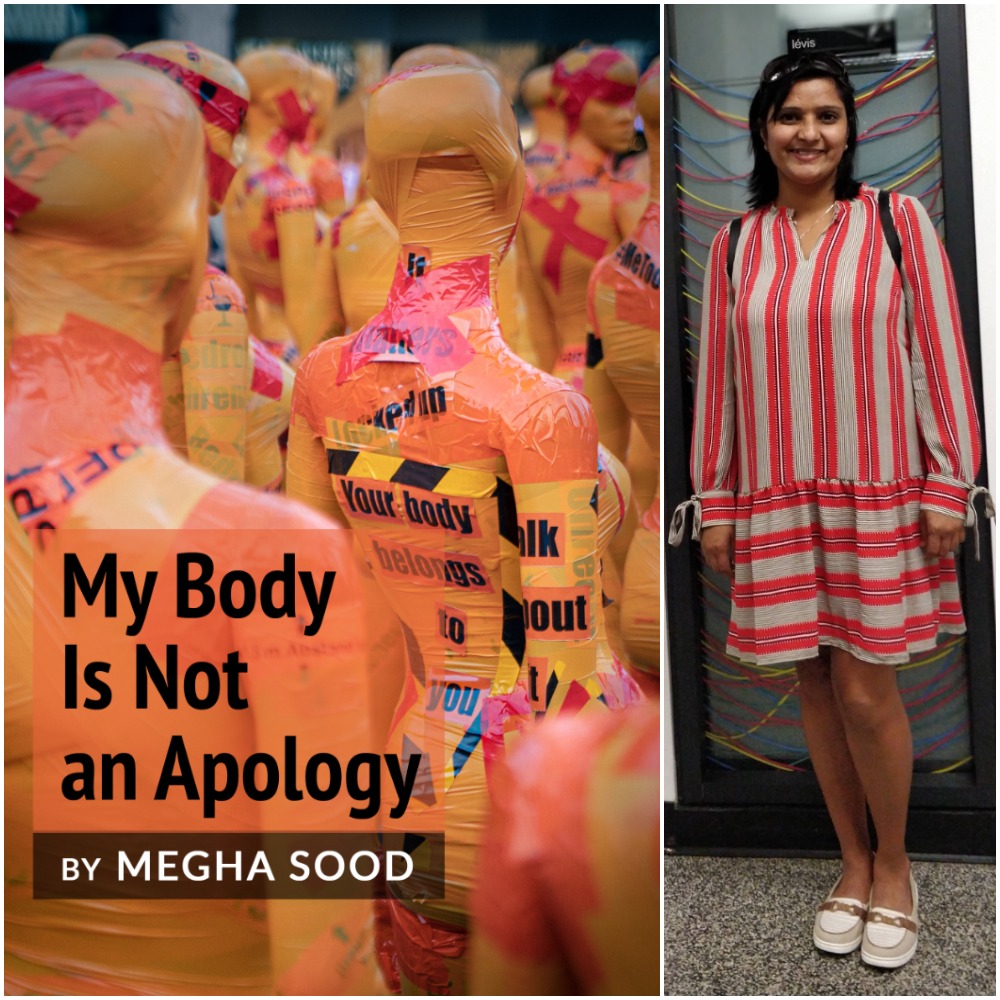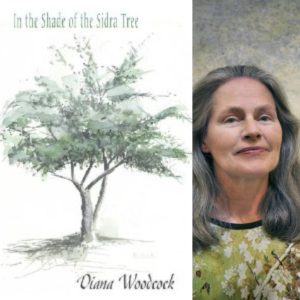My Body is Not An Apology is a testimony of female rebellion and a journey of self-discovery in a most wanted and unwanted way. The poems roar to voice the pain of silent torture, cruelty, and agony of a woman’s heart to reclaim her dignity not only as a female but also as an individual. This book is a fierce approach to life in poetry, and the poet dissects the ironies of women’s existence with razor-sharp language, intellect, and courage like Simone de Beauvoir. In the poet’s own words, it is a triumphant proclamation and an unfettered declaration.
–Kalpna Singh-Chitnis (Poet, Writer, and Filmmaker)
Sometimes with acerbic irony, sometimes with wise comeuppance, but never with hopeless resignation no matter how bleak the refracted rays of reality, Megha’s stanzas find their way through the blind alleys of patriarchy and misogyny looking it unblinking in the eye. The vulnerability of her perception is also her strength, as each stanza duals with difficult truths using the female body and the form of poetry as weapons of grit and gumption. This little book is a fist of fury and unveiling.
–Rochelle Potkar, Author of Paper Asylum & Bombay Hangovers
These poems recognize the body as the ‘eye of the storm’ in the turbulent churning of our age. The guttural cry of the feminine forges these poems with a primal rawness cast in images as varied as radishes, pickles, broken book spines, and armchairs. Megha Sood joins her unapologetic voice with urgency to erase any error of ambiguity, ‘You don’t own shit’. These poems will ‘sit like a welt’ on the tongue of the world.
–Usha Akella, Poet & Founder, Matwaala, South Asian Diaspora Poetry Festival
A unique feminist exploration through the written word, investigating the body and the world society overlays atop women, Megha Sood does justice uncovering, discovering, and discarding herself to find an inexorably beautiful woman within. Sood’s My Body Is Not an Apology chisels away at the construct our society imposes on women, revealing an exemplar poet of the highest caliber.
–Joshua Corwin, author of Becoming Vulnerable
Megha Sood’s “My Body is Not an Apology” is a powerful debut with poetry that contains multitudes. These poems are fierce and unapologetic as they explore the toxic culture around gender-based discrimination and reproductive rights. Sood crafts with cutting precision as we read about personal experience and the influence of these issues in the wider world. Far from a desperate cry of the disenfranchised, these poems raise a fist and demand to be heard from a position of strength. Woven in and around every poem is the question that asks: what would life be like if we could change this? This book is a clarion call to eradicating gender-based injustice. It is also a book full of hope and empowerment.
–Juliette van der Molen, Poet, Writer,Feminist
My Body is Not an Apology by Megha Sood is a woman’s journey through gender-based discrimination. It is a cry and a plea as Sood questions, “How can you live a life like a broken spine of a book?” In her poems, we see a parallel to Sylvia Plath, and her words bring alive the voices of the Bronte Sisters, Emily Dickinson, and Phyllis Wheatley. At the same time, we see similarities to Sarojini Naidu’s rage and certitude when Sood says, “But I never give up …as I learned from the footsteps of warriors.” Sood’s My Body is Not An Apology is a whimper, a roar, an awakening in the feminist world.
–Meenakshi Mohan, Ed.D., Professor, writer, painter, critic
Megha Sood’s poems show a vulnerability that is welded to resilience in remarkably ingenious ways because poetry occupies the interstice between the felt and the unspoken.
Don’t let the aroma leave the pickle jar
Keep the lid tight
my granny used to say–
Some things are better left unspoken. (Even My Grief Should Be Productive)
Here’s the wisdom of an entire civilization. Sometimes it comes pickled in a jar. Call it Indian or South Asian, or what you will. It teaches you how to hold one’s own, anywhere.
–Lakshmi Kannan, Poet, Novelist, Short story writer, and Translator.
Megha Sood’s chapbook, My Body Is Not An Apology is exactly what the title says. The human body is not an apology for anyone. It’s not meant to make us feel ashamed simply for being born as we are, for existing, for belonging to any race, religion, gender, age, or any diversity markers that exist in our world. Our body is also not space where anyone can reside with abuse, disdain, or evil. Our body is a temple where our soul lives protected and safe. Megha through her deeply sensitive and poignant poems urges readers to ponder, deliberate, and act upon ensuring that our body is not an apology. Megha’s poems are fierce and tender at the same time. They are like raging storms or quiet whispers; both compel us to listen, look and consider. Megha delves into a plethora of issues that plague the human mind and in consequence the body. She questions and pulls the reader back again and again to her poems leaving behind a memory of heightened awareness. Very few writers can do as such. This collection of twenty-five poems will surely leave a mark upon your heart. Among the contemporary diaspora writers, Megha Sood is one to definitely read!
–Anita Nahal, poet, professor, flash fictionist & children’s writer. Find her works at: https://anitanahal.wixsite.com/anitanahal
“I would venture to guess that Anon, who wrote so many poems without signing them, was often a woman.”—Virginia Woolf, A Room of One’s Own
The gripping, riveting poems of Megha Sood’s chapbook ‘My Body Is Not An Apology’ carries the inherent legacy of the truths that our exemplary literary predecessors Virginia Woolf, Maya Angelou, Sylvia Plath, Nikki Giovani, Alice Walker, Kamala Das, and others, embodying unabashed feminism, upheld in their poetic creations.
When the poet utters her angst and her rhetoric reflects a discourse, built around the quintessential strength of a woman, these lines are born from her pen: “My body is not an apology/ it’s a roar: a declaration/ an unapologetic/ unabashed/ straight truth in your face/ a war cry:/ a deafening scream from the silence.” These lines hit the nail at just the right place, confronting the age-old power dynamics of a patriarchal social structure. As a strong woman of color, as a sensitive poet, her verses in the collection are like smoking cinders of the thinking feminine voice, empowering and liberating the feminine psyche. In the growth of her poetic voice, she has successfully absorbed the little nuances of her Indian roots and her grandmother’s legacy of truth (reflected in the poem ‘Even My Grief Should Be Productive), at the same time, having the deep insight of a woman acknowledging that her ‘body goes from a shade darker than yesterday’, as she gives birth to her ‘own revolution’. In the collection, the body and being of the poet as a woman reaches its zenith of celebration as she categorically unfolds the themes of the feminine identity, body politics, repression of womanhood, and also, the rampant rhetorics of violence ingrained in our postmodern society. Her voice is both subtle and empowering, essential and redeeming, hence the chapbook will indeed be an asset in the ever-evolving arena of feminist writing and art.
–Lopa Banerjee, Critically acclaimed author, poet, translator, editor from Texas, USA






Reviews
There are no reviews yet.